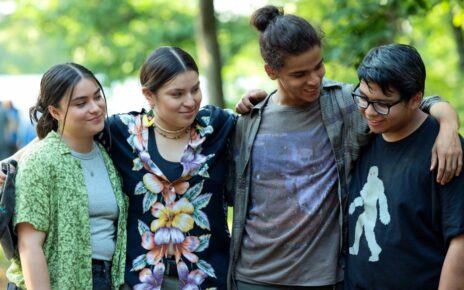When “Trees of Peace,” a drama set during the 1994 Rwandan genocide, surged into the top 10 English-language films on Netflix in June, some may have been amazed that a low-budget, albeit critically acclaimed indie was among the most-watched movies of the week. But executive producer Nicole Avant (“The Black Godfather”) wasn’t among them.
“It was incredible. I was surprised how quickly it got so much attention, but I wasn’t surprised,” Avant tells Variety about learning that the film racked up more than 9.3 million hours viewed in those first few days.
To Avant, the numbers indicated that audiences was ready for and interested in stories like this, despite its heavy subject matter.
“We’ve all felt pretty beaten up for many years, with all this social unrest happening in the United States and everywhere around the world, and just so much negativity,” she explains. “Then here comes this film about strength, about courage, being victorious, being vulnerable, about friendship and about love, just the importance of us looking at each other as one tribe and one family — which is the human family and the human race — I think that’s what people responded to energetically.”
Plus, seeing that the film ranked in the top 10 in more than 30 countries proved another truth about the audience: “We might look different and sound different, speak a different language and be a different religion, but the heart is the same,” she adds.
Written and directed by Alanna Brown, “Trees of Peace” centers on four women — Annick (Eliane Umuhire), a Hutu moderate; Mutesi (Bola Koleosho), a Tutsi woman; Jeanette (Charmaine Bingwa), a Christian nun; and Peyton (Ella Cannon), an American girl visiting Rwanda as part of the Peace Project — who hide in a tiny underground cellar during the period of ethnic-based violence, as hundreds of thousands of men, women, and children of the Tutsi community were murdered by armed men from the Hutu community. Their will is tested as they wait out the bloodshed, day after day, and the women grow closer as they explore their different backgrounds and beliefs.

It’s a tale of survival that Avant was captivated by from the moment producers Ron and Michelle Ray approached her with a rough cut of the movie in 2020.
“I’ve never met anybody so positively aggressive and passionate about any project, and I’ve been around this for a long time,” Avant says, recounting her early conversations with Ron Ray. “I said, ‘Who is directing this? Because this footage that you sent me is phenomenal.’ He said, ‘Her name is Alanna Brown. She’s a young African American woman and it’s her first film.’ That’s what really made me jump in.”
As much as she believed in Brown — who she describes as smart, capable, confident and “so passionate about this story of hope, a story to remind all of us how fragile life is“ — Avant was also drawn to the story’s perspective on compassion and vulnerability.
“Every theme is something I believe in, or try to live by, or is a theme that rules my soul — whether it’s about strength or choosing to be victorious,” she says. “All these themes that are very important to me personally on my own soul’s journey, I saw when I read the script.”
At the time Avant was looking for a follow-up project to “The Black Godfather,” the award-winning documentary she produced about the life and career of her father, music mogul Clarence Avant. It was also in the middle of the COVID-19 pandemic lockdowns, where she found herself reevaluating the type of projects she wanted to get involved in.
“The world was shut down and all of our perspectives changed,” she recalls. “All of a sudden, I was re-examining my life, asking ‘What is important? What’s not important? What kind of stories do I want to put out into the world as a producer? What do I want my name on?’ It was so much more important to me in 2020 than ever before.”
One scene in particular caught Avant’s attention: when Annick (Umuhire) and her husband, Francois (Tongayi Chirisa) make the decision to hide the other three women in their home.
“It was really beautiful what they were doing, how selfless the act was — We’re going to hide other people that don’t even like us, that see us as the enemy, but we see them as human and we are going to hide them,” she recalls thinking. “That alone triggered something inside of my heart, and it made me ask myself, ‘Wow, would I do that? Am I that big of a person? Am I that selfless?’”

With the exception of 2004’s “Hotel Rwanda,” the story of the genocide hasn’t gotten a ton of Hollywood attention and Avant found Brown’s focus on the female perspective particularly interesting, given the political changes that resulted from this period in time, as Rwanda now has the highest percentage of women appointed to government anywhere in the world. Intimately knowledgeable about the experience of women in politics as the former U.S. ambassador to the Bahamas, Avant was interested in illustrating “how they took something so tragic and so horrific, and found a way to come out of it and do better and move forward.”
She adds: “I was so proud that Alanna wanted to tell this story and really highlight the power of unity and the power of women, coming together saying, ‘This terrible thing happened, but what are we going to do about it right now? How are we going to push this forward for the next generation that this hopefully doesn’t happen again?’”
Where society has gotten so focused on examining what’s wrong in our relationships with one another, Avant hopes “Trees of Peace” offers audiences an example of what can happen when we do what’s right.
“This film is about humanity and how we treat each other. It’s about the goodness of humanity and the not so good of humanity,” Avant explains. “Humans are the only animals on the planet that have free will, so we have we get to choose each day, how we’re going to behave and how we’re going to show up in the world. And I think this film calls upon the audience to ask themselves, ‘How am I going to show up in the world? Who am I in the world? And what kind of energy do I want to put forth?’”
After Avant signed on, the filmmakers continued to tinker with the project, ultimately debuting the film at the Santa Barbara International Film Festival in April 2021, where it won two prizes for best film, as the ADL Stand Up Award winner and earning the Panavision Spirit Award for Independent Cinema.
The film picked up more laurels at the American Black Film Festival – where it won the jury award for best narrative feature and Brown was named best director and earned the John Singleton Award for best first feature – as well as the African International Film Fest, the Phoenix Film Fest, the Switzerland Int’l Film Fest and WorldFest Houston.
https://www.instagram.com/p/CW6eZK3hLwX/
A post shared by ALANNA 🎬 BROWN (@abrowngirlfilms)
“I remember the first [award] coming in and I just said to myself, ‘I knew it,’” Avant exclaims. “It felt so good to have been so passionate and to have given so much energy to something, and been on a ride with such incredible people, and then to see these accolades come back for Alanna, Ron and Michelle. It was the icing on the cake for me.”
Netflix nabbed the rights to the project in March, in a highly competitive situation, after CEO Ted Sarandos, Avant’s husband, witnessed her emotional reaction to the final cut. “It’s funny, I try not to mix business with my personal life,” Avant says. She didn’t plan to pitch the project to the streamer, but her near-hysterical tears and her effusive praise for Brown intrigued Sarandos, and when he watched the film, his reaction was decisive. “He just said, I think we have a home for her.”
And the rest is streaming history.
Becoming a movie producer was a dream that appeared later in life for Avant, but growing up, her parents, Clarence and the late Jacqueline Avant, a philanthropist, fostered her love of the arts, especially movies, and exposed her to their potential to create change. Jacqueline Avant had a particular affinity for documentaries, sitting her daughter down to watch PBS and seminal films or docuseries like “Eye on the Prize.”
“She understood the power of imagery,” Avant recalls. “It was like, ‘I can talk about the unfairness, and you could read about it, but if you actually see it, it will change your perspective forever.’ She gave me that gift of always loving stories and anything on film that was inspiring, empowering and motivating, and that changed my spirit for the better.”
Avant has a few other projects in the works; next up is another narrative feature, details of which are yet to be announced. But she teases that it is a film about redemption and triumph. “It’s always about the human spirit. Because those are always the movies that that got me to where I am today,” she explains.
While her love of documentary films slightly outweighs her affinity for fiction, Avant is more focused on what the films she makes will say to and about the world versus which medium she’ll use to say it.
“Whether it’s a documentary or a feature film, I always want to remind humans of the best version of the human spirit,” she says. “I only want to produce anything that really makes you think and focus and understand learn about other people and make you better in some little way. Anything I attach my name to, I hope that it makes people better or it creates healing.”
Read More About:
Source: Read Full Article

